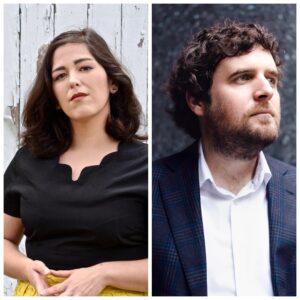
Q & A: Composer Matteo Neri & Librettist Alejandra Martinez on Creating New ‘Escobar’ Opera
By David SalazarPablo Escobar means different things to different people. For many, he’s the ultimate representation of the evil of drug cartels and of the druglord and crime at large. A terrorist. For those who defend his image, he’s hated because he’s the ultimate rags to riches story, a rebel who turned capitalism against its gatekeepers. For an entire generation of Colombians, Escobar defined what a Colombian was thought of by people around the world. Growing up in the United States as the son of Colombian immigrants, the mere mention of my identity as a Colombian immediately and inevitably brought the association to the fore. That trauma continues for many Colombians.
Thirty years after his death, the druglord continues to be a major world figure in the collective consciousness, eliciting numerous interpretations and explorations about the impact he had on the world.
Gabriel García Márquez’s “News of a Kidnapping” is inspired by an event related to Escobar. Netflix’s first season of “Narcos” is all about him. Colombia produced a soap opera “El Patron del Mal,” that while implying his evil in the title, portrays him as a tragic hero, and thus launched the popular “narconovelas” genre that glorifies druglords in a similar vein. There are countless films and books about the man. And if you walk the streets of major Colombian cities, numerous street vendors are selling magnets, pins, or other souvenirs featuring the druglord and his now iconic lines like “Plata o plomo.”
The opera world will get its own introduction to Escobar in an upcoming opera by composer Matteo Neri and librettist / soprano Alejandra Martinez. The work-in-progress was selected as part of Fort Worth Opera’s “Frontiers Showcase” in 2017 and is currently being developed with Florida Grand Opera ahead of its 2025 world premiere. On Dec. 1 and 2, the new “Escobar” opera will get a workshop at Opera Theater Rutgers. I spoke with Neri and Martinez about their new work, what inspired it, how they chose to explore the subject, and what the future holds for “Escobar.”
OperaWire: The first question for me is what drew you to the subject of Escobar for an opera? What can audiences expect from this work and what do you hope to explore with the subject?
Matteo Neri: My journey with “Escobar” began in 2016; my best friend, tenor Josh Page, actually came up with the concept. I admit, I was not very familiar with Pablo Escobar until Josh told me a bit about the story. I was intrigued enough to do some research, and I immediately saw him as a perfect character for an opera. I believe that all of the great operatic protagonists are complex characters, and Pablo Escobar definitely fits that mold. He is someone who committed horrible crimes, but at the same time gave back to his community and loved his family. He rose to power from nothing and then fell from power in a very dramatic way, ultimately leading to his death. As time went on, I realized that this opera also created an opportunity to showcase the true cost of the war on drugs, an issue that I am very passionate about, and one that is still very relevant today in many countries thirty years after the death of Pablo Escobar. Additionally, I wanted to write an opera that is entirely in Spanish; it is a language that is well suited for singing, yet it has historically been very underutilized in opera.
Alejandra Martinez: Some years ago, Matteo invited me to be a part of the creation of this work. He was looking for a Spanish-language librettist and I was still in the early stages of my development as a writer, so I thought it would be a good project to really cut my teeth on. From the beginning, we were sensitive to the controversy surrounding the story of Pablo Escobar and the impact it continues to have, especially on people of Colombian heritage. We sought to shape the opera and its characters in a way that avoids cliches and stereotypes while building a compelling, cohesive plot that would fit within a theater piece of two hours or so. What we hope audiences will take away from “Escobar” is that Pablo Escobar was just a man, not a myth, not a monster, not a demigod. Especially in the current geopolitical climate, I think it is important to remember that.
OW: I want to know a bit about your process of working on this together. What have you learned from working together? What are your individual approaches to your respective roles as composer and librettist?
MN: When I began initial work on “Escobar” back in 2016, I was writing the libretto and the storyline myself, which, to put it lightly, was not ideal. I was struggling to form a compelling narrative, and while I do speak modest conversational Spanish, I needed a collaborator who had a firm grasp of Spanish-language nuances (my native languages are English and Italian). It was clear that I needed a librettist. As is typical in the digital age, Alejandra and I met on Facebook- specifically, a Facebook group that at the time was called “Contemporary Opera Connection” (the group is now called “21st Century Opera Creators”). Alejandra and I met in the Spring of 2021, and this has been the most fulfilling collaboration of my life. We would meet almost weekly for months to work out the treatment (essentially, a long form synopsis), and when she started to write the libretto, I was stunned by the beauty of her poetry.
AM: The work has really developed evenly between the two of us. After some initial meetings where we discussed the overall shape of the opera, we focused primarily on the arias and ensembles of Act 1. We would discuss our goals, I would write a draft, Matteo and I would edit it together, and then Matteo would begin the scoring process. As a librettist, I’m not overly precious about my writing–if a scene serves the work it stays, if it doesn’t it goes, no matter how much I may personally like it. My writing for this piece also tends to lean towards the cinematic and melodramatic, which I feel pairs really well with Matteo’s musical language.
OW: What have been the greatest challenges of creating this work and how has it changed throughout the workshopping process? What kind of research was involved in the creation of the opera?
MN: The most significant challenge for me has been how to portray Pablo Escobar in a way that is sensitive and responsible; in the United States and in most other countries, Pablo Escobar has a bit of a glorified persona. After speaking with many Colombians over the years, almost all of whom have had family members who were directly impacted by the Medellín Cartel, I wanted to make sure that this opera glorified the country of Colombia and the Colombian people, rather than Pablo Escobar. At the same time, this is history, and Pablo Escobar, as evil as he was, is a significant historical figure who dramatically affected Colombia and the world in many different ways (and in ways that are particularly conducive to the operatic art form), so I strongly believe that he is a figure that deserves an opera. Alejandra and I are very conscious of how sensitive the subject matter is, and I believe that we have created a work that is theatrically engaging, but also one that showcases the tenacity of the Colombian people and the incredible progress that has been made. In terms of research, I have relied mostly on secondary sources, such as the biography by Paul Bowden and the well-known book by his son, Juan Pablo Escobar, while Alejandra has gone very deep into primary sources. The knowledge both of us gathered gave us a firm foundation when we began to work on the treatment. I am also, of course, very familiar with both the Colombian telenovela “Escobar: El Patrón del Mal,” produced by Caracol Televisión, and the Netflix show “Narcos.”
AM: One of the greatest challenges has been learning to balance the actual history with the need to tell a clear narrative within the time and logistical boundaries of an opera. I previously was a teacher for an Introduction to Latin American History college course. That experience made me very passionate about Latine history–there was so much I never knew growing up. However, opera is a difficult medium for historical stories because it is relatively short and there is a major focus on inner emotions that are virtually unknowable to anyone but the person feeling them. Even so, I find historical topics to be rich sources for opera adaptation. Of course, adapting “Escobar” required a huge amount of research, although I very intentionally avoided all popular media portrayals of Pablo Escobar in order to avoid being influenced by Hollywood (read: American) biases. I tried to stick as much as possible to primary sources, contemporary news reports, Colombian periodicals, etc. We also interviewed several people who were intimately familiar with this part of Colombia’s history and made changes to the shape of the story and depictions of certain characters as a result.
OW: In this opera, you are centering three women – Sara Martinez, Maria Victoria, and Diana Turbay. How did you go about exploring their stories? Were you able to get in touch with people close to them in order to understand their experiences during this time? How do each of these women’s lives explore the theme of ” the Colombian people’s victory over Pablo Escobar?”
AM: Originally, “Escobar” did not have such prominent roles for women, but given the history of cartel violence against women across Latin America, we felt it was important to reshape the narrative in order to center Sara, Maria Victoria, and Diana. We were lucky enough to speak with people who were willing to share what they knew about these women. Their feedback helped us to create these characters in a way that we hope will feel honest, meaningful, and diverse. Despite starting out idealistic, Sara comes to represent the disillusioned and desensitized people who have lived in a state of chaos for so long. Maria Victoria, however much she wishes to distance herself from her husband’s wrongdoing, must come to terms with her own complicity and complicated feelings as Pablo Escobar’s wife and mother of his children. Finally, Diana, a reporter who carries the banner of truth, is senselessly killed; through her, we hope to explore the dangers that journalists face as well as the fact that any war, including the war against drugs, will always have civilian casualties.
OW: To that effect, how much of Escobar’s character is explored in the opera and how is he portrayed musically?
MN: For me as the composer, I wanted to explore the delusional psyche of Pablo Escobar, as well as the horrific reality of what he did. As an example, his opening aria, “Basta Gustavo,” has a catchy tune, is very tonal, and is almost heroic in nature; however, the intent of this is not to glorify him, it is to capture the delusion of himself as a hero. As the opera progresses, his music becomes significantly more chromatic (yet still lyrical) to capture the reality of the evil that he committed. This is one reason why a complex character is good for opera; these kinds of characters give the composer many opportunities to create musical contrast.
AN: Pablo Escobar’s character is partially inspired by another infamous operatic figure–Don Giovanni. He is ambitious, proud, narcissistic, and controlling and these traits contribute to his downfall. In the second act, he descends into a not-completely-unfounded paranoia, which causes him to lash out erratically and make mistakes. Despite this, his estimation of himself never fades, and even in hiding he refers to himself as the “Prince of Río Negro.”
OW: On the subject of music – what was the approach? Given that this is a Colombian story, does Colombian music play a part in the score? And if so, how is it integrated into the operatic form? How did you approach the vocal lines of the characters to give them their own unique identities?
MN: While I am very inspired by Latin music, including certain Colombian musical genres such as Cumbia, I did not score the opera with the intent of “sounding” Colombian. I felt like if I went too far in that direction, I would not be true to myself. I am not, for example, a Cumbia songwriter or musician, so I felt like if I wrote a score in that style, I would risk composing an opera that was lower in quality, and perhaps even composing something that sounds culturally appropriated. The themes of this opera are universal (in a literary sense), so I made sure that I wrote music that was entirely inspired by my own creative conscience.
For the musical identities of the characters, I relied heavily on leitmotifs (recurring themes that represent characters/ideas). For example, Diana Turbay, who is a journalist who is kidnapped by Escobar’s men, has a recurring leitmotif that is based on her opening aria, called the “Newsroom Aria” (where she is reporting on breaking news of an assassination that Escobar committed). I used my experience in visual media scoring to write a theme for her that sounds like a breaking news theme on TV. At the end of the act, before Diana is killed, she sings a hymn-like prayer, a situation that is very different from her aria at the beginning; however, the hymn is still based on the breaking news theme from the aria.
OW: Do you have information on the premiere and where we might expect to see the opera for the first time? How has the process of pitching it to different companies been?
MN: For most composers writing their first grand opera, getting a premiere is often an impossible endeavor; however, I have been incredibly fortunate to have had a lot of support for this project from professional companies. Florida Grand Opera, under Susan Danis, was leading a coproduction of companies that were planning to premiere the full work in the 2025-2026 season. As many know, Susan resigned from Florida Grand Opera in September, and we are now just waiting for the leadership transition to settle before moving the coproduction forward again. Regardless, none of this would even be written if it was not for Susan’s support, so I just want to take this opportunity to give her all my thanks.
OW: What do you hope that audiences, Colombians and others, take away from this opera? What kind of experience do you want them to have when they see “Escobar.”
Both: We hope that audiences will come away having seen a different approach to a history that has been frequently replayed in popular media. We have strived to create interesting characters–truthfully fictional versions of their historical counterparts–who will draw people into their inner worlds, their hopes and dreams, their fear and rage, their honesty and hypocrisy.


